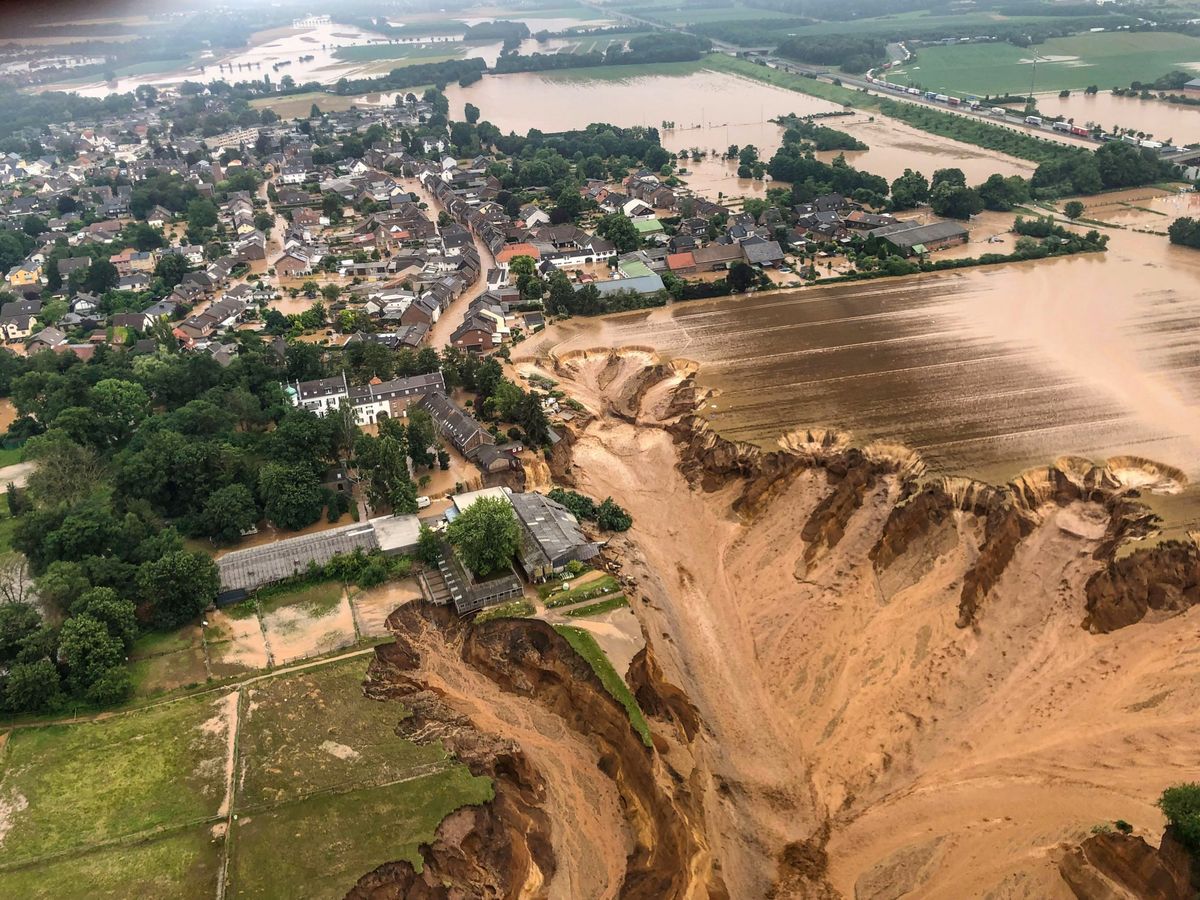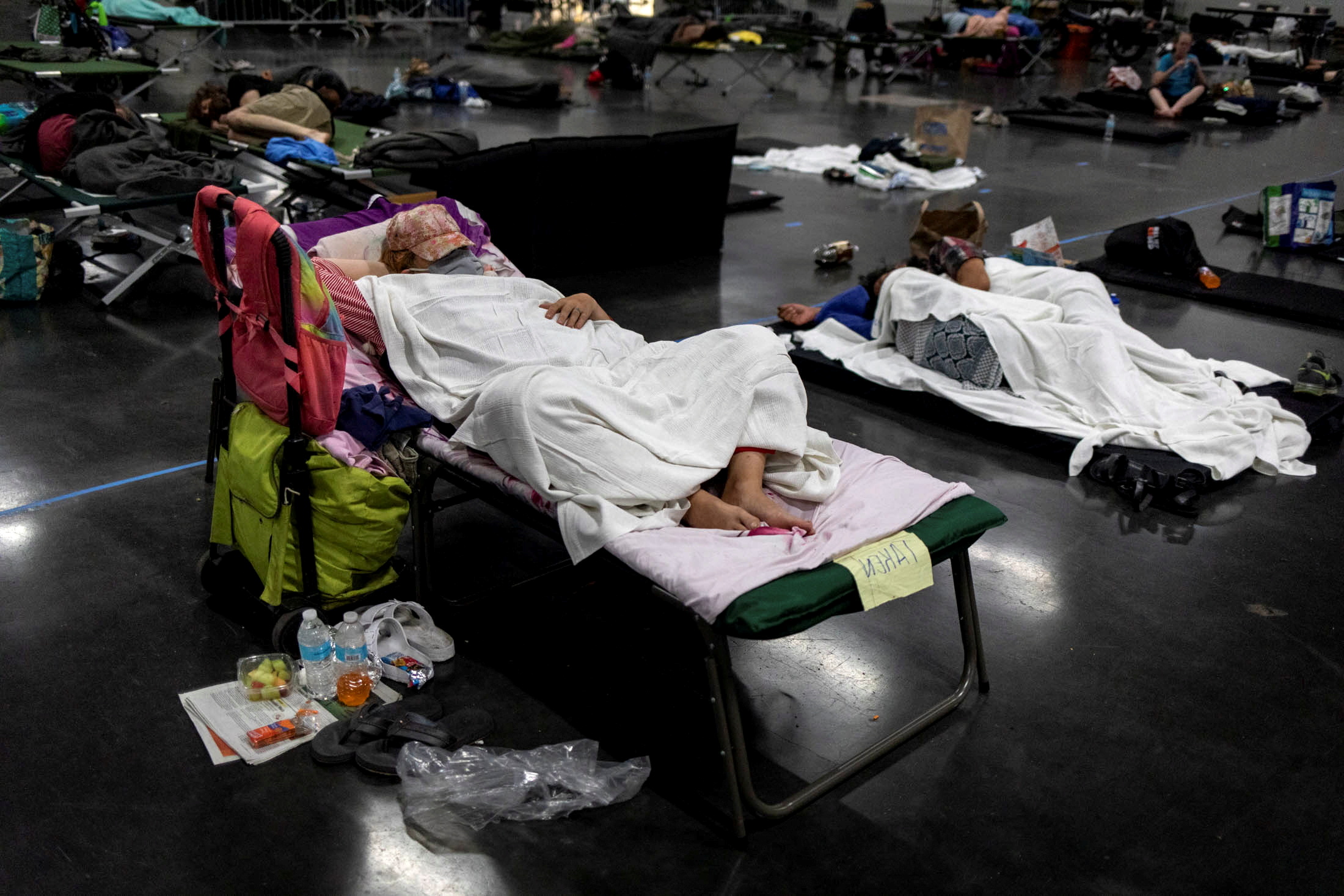How climate change has fueled floods across Europe and record-high temperatures in North America

A few minutes every morning is all you need.
Stay up to date on the world's Headlines and Human Stories. It's fun, it's factual, it's fluff-free.
Globally, there are different proposals with slightly different criticisms, but they all basically boil down to the fact that eventually, it’s going to have to cost someone something to fix the problem and who that someone is is up for debate.
What’s happening?
- Floods are sweeping through the western parts of Germany and Belgium, destroying houses and streets, cutting off communication and killing more than 120 people.
- In the Pacific Northwest, major wildfires are burning through nearly 400 square miles in Oregon and California.
- The fires come as record high temperatures plague the United States as a whole with California’s Death Valley reaching a peak of 130 degrees Fahrenheit (54 Celsius) on July 11, according to the National Weather Service. The heat wave has also already killed over 115 people in Oregon.
- This Summer, Canada smashed the national temperature records three times, peaking at 121 Fahrenheit (49.6 Celsius) in late June. All of this has amounted to the hottest June on record for North America in 127 years of record-keeping.

- And future estimates are equally terrifying. One analysis commissioned by the International Labour Organisation (ILO) warns that a massive portion of apparel-producing regions in Asia will be underwater by the end of the decade.
- Another study, led by NASA scientists, said that US coastal flooding will be accelerated by about 70 years due to rising sea levels and an abnormal wobble found in the moon, which will take the better part of two decades to correct.
What’s causing the severe weather?
- Most scientists are attributing the extreme weather patterns to climate change.
- In Europe, meteorologists are pointing to the shifting heavy, strong winds that brought heavy rain that would normally stay out in the sea, inland.
- In the Pacific Northwest, a study found that the heat wave would have been “virtually impossible” without climate change. The question we need to answer is how does climate change cause heat waves?
- “Heat waves are really changing so much more and so much faster than all other extreme events,” said Friederike Otto, a climate scientist at the University of Oxford, and co-leader of the World Weather Attribution. “Heat preparation and preventing death during heat waves need to be a No. 1 priority for every city authority.”
- Scientists estimate that normally the extreme heat would happen once in a thousand years, but climate change made it 150 times more likely to happen.
What’s climate change, again?
- Climate change is the long-term shift of temperature patterns in an area over a period of time and has been mostly linked to the greenhouse gas effect.
- The greenhouse gas effect is a natural way the earth warms itself. The process involves trapping heat from the sun and keep the earth warm, rather than letting that warmth escape back into space.
- Without this natural process, the earth would be uninhabitable because it would just be too cold.
- The issue is, because of human activity such as the burning of fossil fuels, there is a lot of greenhouse gases being created and emitted into our atmosphere.
- This is causing a lot more heat and energy to be trapped on the earth, temperatures to rise and more cases of extreme weather around the world.
What’s being done about it?
- Most recently, the European Commission presented a proposal to combat climate change, aiming to reduce greenhouse gas emissions by 55% below 1990 levels by 2030. The whole aim is to make Europe “the world’s first climate-neutral continent by 2050.”
- The proposal raises the cost of things like heating, transportation and manufacturing, along with taxing aviation fuel and shipping fuel, saying that these are sources of high-carbon emissions and have never been taxed before.
- Supporters of the plan called it an “obligation,” with EU climate policy chief Frans Timmermans saying that, “if we renounce our obligation to help humanity, live within planetary boundaries, we would not fail, not just ourselves, but we would fail our children and our grandchildren.”
- Skeptics of the proposal say that raising the price of goods for the consumer isn’t fair, worrying that it will lead to such high costs of living, which would cause protests and derail the plan before it even has a chance to work.
- Globally, there are different proposals with slightly different criticisms, but they all basically boil down to the fact that eventually, it’s going to have to cost someone something to fix the problem and who that someone is is up for debate.
What next?
- It’s a bit of an existential question, but, the main goal should obviously be to reduce carbon and greenhouse gas emissions to try slow the severity of climate change.
- Despite the horrible nature of the pandemic, one good thing to come out of 2020 was the single greatest drop in climate emissions since World War II because of the widespread lockdowns.
- Scientists widely agree that catastrophic climate events, like heat waves or flooding, will be a norm in the future.
- The same study that found that the extreme heat wave in the Pacific Northeast was a once-in-a-thousand-year event also found that events just as extreme could happen every five to 10 years by the 2040s.
- So, while things will get worse before they get better, we can all do our part to try improve the situation.
- This includes reducing our meat consumption and being more mindful about the dark sides of fast fashion.
Have a tip or story? Get in touch with our reporters at tips@themilsource.com




Comments ()